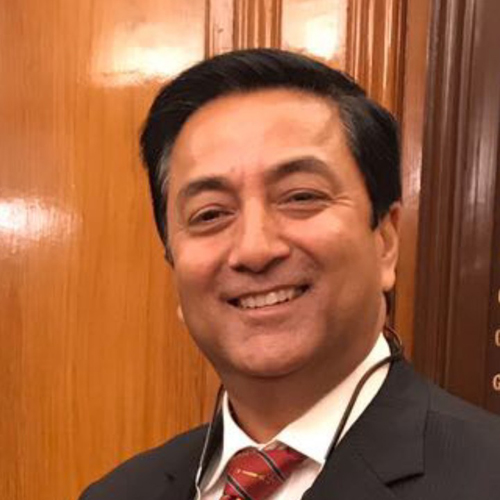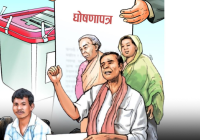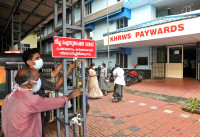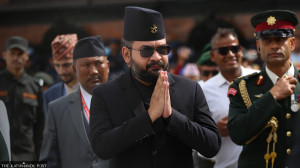Opinion
Trouble in Turkey
Nepal has also experienced several coups that can be taken as a blow to the country
Binoj Basnyat
As I was following the coup attempt in Turkey on the news, I began to think of the coups that have transpired in South Asia. The events in Turkey also encouraged me to review Nepal’s situation and the state of the Army and other security forces. It is widely perceived, especially in the Americas and Europe, that the era of military intervention in politics is over as Idi Amin and Hafez al-Assad are long dead, and the world has seen the likes of Mubarak toppled and Pinochet voted out of power. Usually, a combination of financial, strategic, tactical and political reasons motivates the armed forces to strike. They find it easier to topple civilian governments which lack legitimacy, have suffered from a political crisis or have failed to establish constructive civil-military relations. Military coups in some South Asian countries have also promoted democratisation, particularly in states that are least likely to democratise otherwise.
Nepal has experienced several coups that can be taken as a blow to the country and a setback for freedom. After 1800, the heirs of Prithvi Narayan Shah proved unable to maintain firm political control and this led to internal turmoil. Nepal lost one-third of its territory to the British Raj in India after the Sugauli Treaty in 1816, and when Jung Bahadur took power following a coup, it provided a sense of assurance. There have been seven coups in Nepal after the Bhandarkhal Massacre in 1806 which was triggered by the assassination of king Rana Bahadur Shah. This established Bhimsen Thapa as the prime minister. The Kot Massacre in 1846 led to a dictatorship and an autocratic Rana regime that lasted for 104 long years. More bloodbaths followed after the Kot Massacre, like the Bhadrakhal Parva, Alau Massacre, Massacre of 1882 and Massacre of 1885. Coming to recent times, Parliament was suspended in 2005 and the monarchy was eventually abolished.
Lesson for Nepal
A coup d’état is considered to be successful if the usurpers can hold on to power for at least seven days. To the relief of the global community, the military coup attempt in Turkey failed miserably. The coup attempt and subsequent events in Turkey have raised a number of questions that are of concern to a geopolitically important country like Nepal. Dictators and military commanders use legitimate security concerns, political volatility, poor law and order situation and terrorist threats to justify delaying reforms, repressing any form of opposition and labelling all foes as terrorists. So why do coups happen? There are mainly four reasons: The armed forces have the capacity and are not under complete civilian control, they have an interest in enacting a coup,
there is no legitimate opponent and there is a degree of popular support. If all these factors are not present, a coup will fail like it did in Turkey, which has witnessed five military coups in the 56 years from 1960 to 2016.
The reasons why the coup attempt in Turkey did not succeed can be a lesson for Nepal. It failed because there was no support from the military or the public, the leaders were unknown faces and there was lack of preparation. Nepal is heading towards a federal set-up, and it is imperative that it functions professionally and democratically. There must be a balance between management of control proceedings and political freedom. The civilian administration functions for the most part unconnectedly from the military establishment for fear of interference or due to lack of understanding.
Beneficial and specialised civil-military relations do not essentially depend on how separate the armed forces are from the civilian sphere. Indeed, too much distance between the two words ‘civil’ and ‘military’ leads to an interruption of association. Less civilian participation leads to a stagnant military doctrine or military act, as it is no longer in line with the country’s grand strategy or constitution. Meanwhile, lack of military contribution to civilian decision-making leads to premeditated inaccuracy. Governments also need to be responsive to what preoccupies the military if they want to thwart a potential coup. This relates to four sections of civil-military relations in particular—the political decision-making process, the social composition of the officer corps, the military doctrine and the military act.
Civil-military relations
Civilians further the probability of a coup by politicalising in two ways—from the top down (that is from the government) or from the bottom up (that is from the political parties in society). In both instances, making an attempt to draw the armed forces into politics is a sign of weakness. Governm-ents, for example, may be dependent on the military as a result of war, domestic crises like the Maoist conflict, lack of authenticity or legitimate processes for articulating dissatisfaction. They may also depend on the military to prolong their tenure.
Political leaders in Nepal can fail to engage in constructive civil-military relations if they use punitive measures to keep the Army in check or maintain too great a distance from the Army. They can also fail if the military is deliberately politicalised to bolster its own position, the political leaders lack the necessary legitimacy to control the military or there is complete civilian control of the Army.
Likewise, they can fail to engage in constructive civil-military relations if amendments are made to the constitution and the Military Act regarding its authority, responsibilities, legal legitimacy and implications, or if there is organisational development of all the security forces for a new political and administrative set-up. Political leaders can fail to engage in constructive civil-military relations due to the establishment of an effective modern intelligence agency different from other agencies of the security forces that provide adequate intelligence for furthering democracy and strengthening stability.
Basnyat is a retired Nepal Army Major General and holds an MPhil degree in defence and strategic studies




 19.12°C Kathmandu
19.12°C Kathmandu










